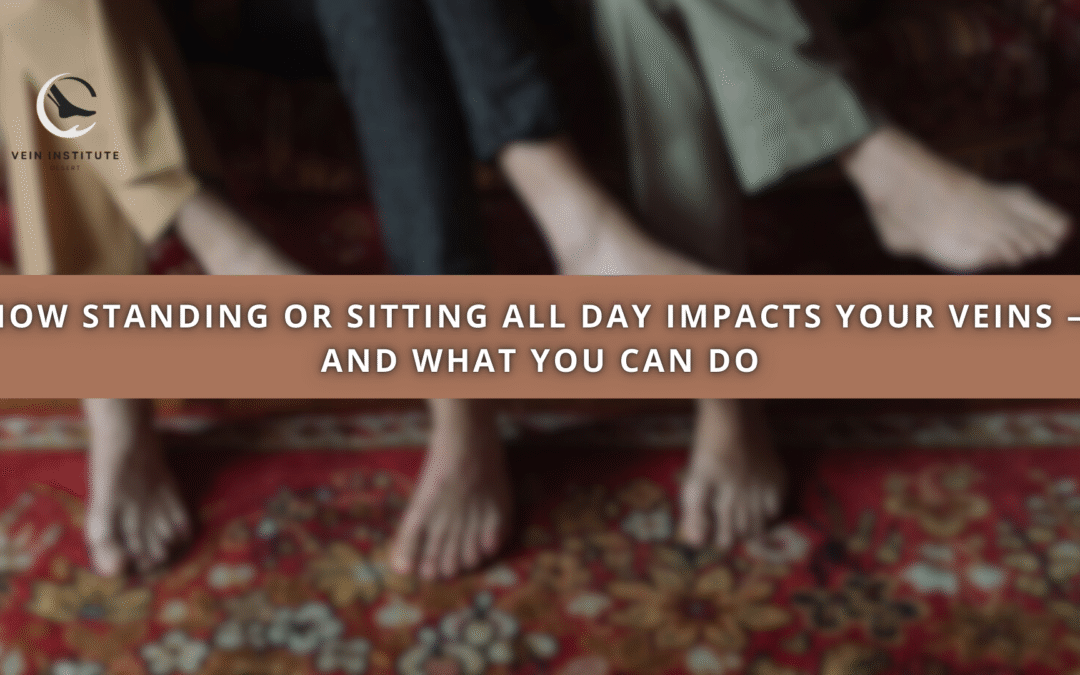How Standing or Sitting All Day Impacts Your Veins
🩺 Why Vein Health Suffers from Prolonged Standing or Sitting
Modern work culture often requires spending hours either at a desk or on your feet. While these positions may seem harmless, the reality is that circulation depends on constant muscle movement to push blood back to the heart. When you remain in one posture too long, blood begins to pool in the lower legs, increasing venous pressure.
This pooling stretches the vein walls, gradually weakening valves that keep blood moving in the right direction. Over time, the strain may result in discomfort, swelling, and the development of varicose veins. People who alternate between sitting and standing for long hours often experience symptoms like heavy legs or night cramps, signaling compromised venous health.
👨⚕️ Why Consulting a Vein Doctor Matters
Early evaluation from a vein doctor can make a significant difference. A physician specializing in circulation understands that the issue is not only cosmetic but also functional. The legs are responsible for carrying a substantial portion of the body’s blood volume, and added strain from inactivity accelerates the onset of venous disorders.
In Palm Desert, where The Vein Institute of the Desert provides care, many patients seek help after years of desk jobs or retail work. By the time they notice visible veins, underlying problems are already advanced. Timely consultation helps prevent complications such as skin discoloration, ulceration, or chronic venous insufficiency.
🧑🔬 The Role of a Vein Specialist in Prevention and Treatment
A vein specialist offers expertise that goes beyond what a general physician may provide. Specialists analyze lifestyle, occupational habits, and circulation patterns to design preventive strategies. For office workers, this might involve structured breaks with calf stretches. For those who stand all day, compression garments and hydration are often recommended.
Specialists also use diagnostic imaging to determine whether valves are functioning properly. Detecting reflux early allows for interventions that are less invasive and more effective. This targeted approach ensures patients don’t just manage symptoms but actively protect their long-term vascular health.
💡 Everyday Habits That Reduce Vein Stress
Fortunately, lifestyle modifications can make a measurable difference. Small adjustments in routine relieve venous pressure and encourage circulation.
✅ Helpful Habits Include:
- 🚶♀️ Taking short walks every hour to stimulate calf muscles
- 💧 Staying hydrated to prevent blood from thickening in hot or dry environments
- 🪑 Adjusting posture and avoiding crossing legs while seated
- 🧦 Using compression stockings for support during long workdays
Though these practices don’t eliminate vein disease risk entirely, they significantly slow progression and improve comfort.
🔬 Advanced Vein Treatment Options
When lifestyle changes are not enough, modern medicine provides solutions. Vein treatment options today are minimally invasive and performed in outpatient settings. Procedures such as sclerotherapy, radiofrequency ablation, and endovenous laser therapy address faulty veins directly, closing them off so blood reroutes through healthier vessels.
At The Vein Institute of the Desert in Palm Desert, patients benefit from procedures that require little downtime and offer both medical and cosmetic relief. This allows individuals to return quickly to their professional and personal routines, with reduced pain and improved confidence in their appearance.
🌴 Why Vein Care Matters for Long-Term Health
Ignoring vein issues can lead to more than cosmetic concerns. Chronic venous insufficiency may cause persistent swelling, skin breakdown, or even open ulcers that are difficult to heal. By seeking evaluation from a qualified specialist, patients protect not only their circulation but also their overall quality of life.
For those who spend long days at a desk or on their feet, the message is clear: maintaining vein health requires proactive care. With guidance from The Vein Institute of the Desert, residents of Palm Desert and the surrounding region have access to expert evaluation and advanced solutions tailored to their lifestyle.

Andy Sharify
The founder and owner of The Vein Institute of the Desert. He oversees the clinic, ensuring exceptional service and a patient-focused approach to vein care. Andy is dedicated to creating a comfortable and supportive environment for every patient.
